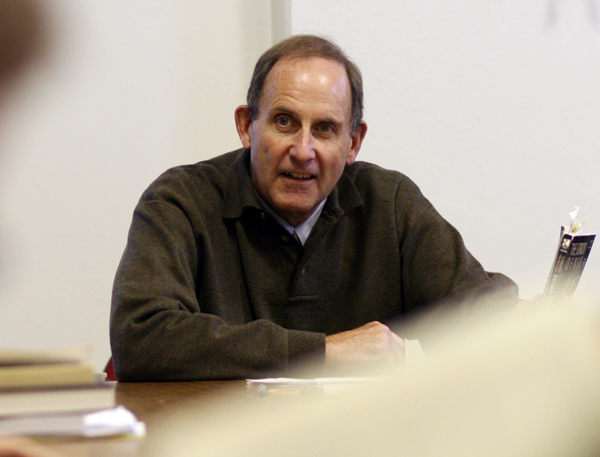
Some people were surprised when a crowd of almost 400—one of the largest attending a campus event all year— gathered in the College's Pioneer Chapel to listen to survivors of the U.S.S Indianapolis talk about World War II and the most tragic disaster in U.S. Naval History.
Not Professor of English Tobey Herzog.
A Vietnam veteran whose latest book Writing Vietnam, Writing Life was published last month by the University of Iowa Press, Herzog knows how powerfully people are drawn to stories of war. He has interviewed and studied the work of the most acclaimed writers from his own war, interviews included in his new book. He’s also interviewed local Vietnam Veterans for the Oral History Project at the Smithsonian Institution.
These conversations have given him insights into why we’re so eager to hear—and to tell—war stories.
"Most of the guys I’ve interviewed in Montgomery County will say, ‘I went off and did something for my country; I’m proud of it, we accomplished some good things over there.’ Some of them say, ‘I’d do it again in a heartbeat.’ And there are some powerful moments in their stories," Herzog says. He recalls one man who broke down during an on-camera interview.
"He had been involved in some pretty heavy combat. It was very moving."
Herzog asked the man why he’d agreed to be interview when he knew it would be such a painful process.
"He said, ‘My children are getting older. I want them to know what I went through, but I can’t do it face to face. So I’m going to give them a copy of this interview to watch.’
"That’s why we tell these stories," Herzog says.
The four writers and Vietnam veterans Herzog interviewed for Writing Vietnam, Writing Life—Phil Caputo, Tim O’Brien, Robert Olen Butler, and Larry Heinemann—have their own reasons for putting their war stories on paper.
First of all, Herzog, points out, they’re good writers.
"The context may be war, and the battlefield is the setting, but good war writers move beyond the battlefield," Herzog says in an interview in the upcoming issue of Wabash Magazine. "They deal with issues we all deal with. The good war writers move easily from writing about war to writing about what O’Brien calls "the war of the living."
But each writer has his own motivations.
"Many people were motivated to write about their experiences in Vietnam because of the hostility toward the war, toward the returning soldiers," says Herzog. " For some people it was to validate their experience, for others it was to explain just how complicated and difficult that experience was.
Herzog’s interviews with O’Brien, Caputo, Butler, and Heinemann delve into the more personal reasons behind their writing.
"For Caputo, it’s not so much about the Vietnam War but his actions in it, particularly one key event he was involved in," Herzog says. "That event and those moral choices haunt him, and at the core of his fiction are moral choices."
"Caputo said that even writers are asking that basic question—Who am I?—that drives so many of us," Herzog says. "Through telling a story, people get a glimpse of themselves. When you tell a story, it’s not only saying something about an event; it also says something about you."
Herzog grew up on his father’s war stories.
"For him, being in World War II was one of the high points of his life," Herzog says. "It was about the friendships he made, and that’s not unusual. If you talk to Vietnam veterans, who were fighting in a war that could be disheartening, confusing, and not popular, the reason they fought was for their fellow soldiers and the bond that they had.
"After I’d gone through the war experience myself, my father’s stories took on a deeper meaning, and I understood better what he was talking about in terms of that close attachment you have to your fellow soldiers."
And he’s passed down his father's, and his own stories, to his sons.
"These are stories they need to know, for their formation as men, but also just to know something about me and to know something about our family.
"Even knowing some of their stories, I have so many questions now about my mom and dad—who they were, what their relationships were with other people," Herzog says. "But I didn’t ask them. I didn't ask enough questions."
"That was one of the driving forces behind this book—wanting to know why these guys are telling all these war stories. Is it a personal motivation or public? A warning to others?
"It turns out to be a combination of these."
Read more about Herzog’s interviews with the top Vietnam War writers in the next issue of Wabash Magazine and at Wabash Magazine Online, on the Web site and on campus the week of April 14.